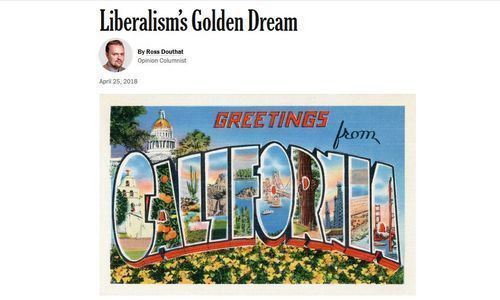


By Steve Sailer
04/25/2018
Ross Douthat writes in The New York Times:
By Ross Douthat
Opinion Columnist
April 25, 2018
… But by coincidence I was in California while I read the Golden State essays, wandering around in Greater Los Angeles with my family, and in the annoying way of pundit-travelers let me make some observations about this vision of a liberal-dominated future.
To begin with, you can’t understand the political transformation of California without understanding how much it has been shaped by a long-term middle class exodus — the out-migration, across years and decades, of the kind of people who in the Trump era tend to vote Republican, the native-born petit-bourgeoisie. This out-migration has been compensated for by in-migration, but the new arrivals are more likely to be either immigrants or well-educated professionals: Since the 1990s new Californians are disproportionately likely to make around $200,000 a year, ex-Californians are disproportionately likely to make around $45,000.
This trend, and the extremity of inequality it has encouraged, is palpable to any tourist, but particularly if you have a personal connection to California’s modern history. In my case I can drive through the neighborhoods of Santa Monica where my father grew up, and see the one-story mission-style house where my grandfather raised three kids as a struggling salesman and small-business man. Or rather, I could until recently, but not on this visit — because it was finally torn down to make way for the more lavish residences that now squat in what was a middle-class paradise two generations back.
My grandfather’s parents came west from Arkansas, looking for healthier climes after a malarial disaster, and the family never had much money and always voted Democratic. Today their middle-class equivalents would likely be making the same migration in reverse (or at the very least lighting out for rural, Trumpier parts of the West Coast, as a Californian uncle of mine did), having been priced out of what was once their promised land. And the fact that many of these migrants might be natural Trump constituents is a good example of the futility of reducing Trump’s appeal to an either-or of racism or economic grievance. Is an ex-Californian who’s doing O.K. economically but lives in a hotter, flatter, less glamorous and ocean-breeze-kissed part of the country than his parents, and who gripes that what was once his middle-class hometown is now all immigrants speaking Spanish and the liberal superrich, worried about ethnic or socioeconomic displacement? The answer really can be both.
So the same trends that have made California so uniformly liberal have also encouraged Trumpism elsewhere — and not only elsewhere, since as Jason Willick and James Hitchcock pointed out in 2016 in The American Interest, Trumpism-the-ideology is very much a made-in-California affair. Not many members of the right-wing intelligentsia backed Trump, but the writers and thinkers who did — from mainstream conservatives to the alt-right fringe — were heavily Californian: the Claremont Institute’s West Coast Straussians, Michael “Flight 93 Election” Anton, Mickey Kaus, Victor Davis Hanson, Ron Unz, Steve Sailer, Scott Adams, Curtis “Mencius Moldbug” Yarvin … and of course the one and only Peter Thiel.
I’d add Benjamin Schwarz and Stephen Miller.
This clutch of internal dissidents doesn’t pose a threat to liberal hegemony in California. But the state’s larger exile population does present a problem for the “make America California” project, because while you can displace Republican-leaning voters from one state, you can’t do the same for the country as a whole.
Don’t give them too many ideas, Ross.
There will be no white-middle-class out-migration to, say, Hungary to ease the path to a Democratic supermajority.
… As in other enclaves where Democrats are dominant, its ruling party has proved itself pretty good at rentier-friendly environmentalism and kicking social conservatives while they’re down, O.K. enough at redistribution, and completely terrible at figuring how to build an information-age middle class.